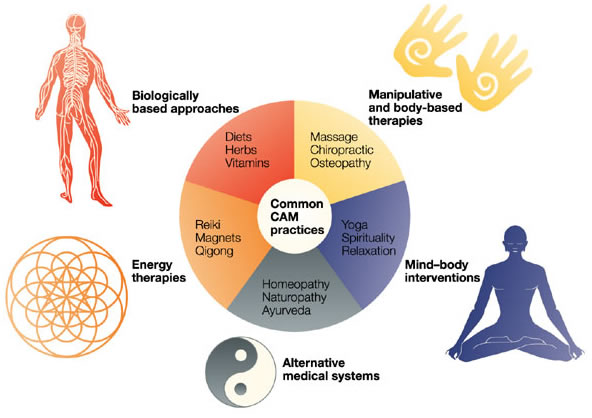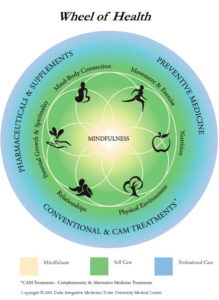Complementary, Alternative, Integrative Medicine? We’ve all seen these words, but what do they really mean? Is there a difference between them?
Compliments of the National Cancer Institute and the National Institute of Health:
This page will help you understand them better and give you a brief picture of NCCIH’s [NIH National Center for Complementary and Integrative Health] mission and role in this area of research. Read here to see what Web MD has to say about acupuncture.
Complementary, Alternative, Integrative Medicine
Complementary, Alternative, Integrative Medicine are all buzz words that we are now hearing practically every day. How do they work? What are they? And what does this mean for your health and well-being?
Complementary Versus Alternative
Many Americans—more than 30 percent of adults and about 12 percent of children—use health care approaches developed outside of mainstream Western, or ‘conventional’, medicine. When describing these approaches, people often use “alternative” and “complementary” interchangeably, but the two terms refer to different concepts:
- If a non-mainstream practice is used together with conventional medicine, it’s considered “complementary.”
- If a non-mainstream practice is used in place of conventional medicine, it’s considered “alternative.”
True alternative medicine is uncommon. Most people who use non-mainstream approaches, use them along with conventional treatments. Therefore, it is beneficial to look into which modalities can best help you.
Integrative Medicine
What IS Integrative Medicine? There are many definitions of “integrative” health care. All involve bringing Western (or conventional medicine) and complementary approaches together in a coordinated way. The use of integrative approaches to health and wellness has grown in care settings across the United States. Researchers are currently exploring the potential benefits of integrative health in a variety of situations. As a result, integrative medicine is now focusing on: pain management for military personnel and veterans, relief of symptoms in cancer patients and survivors, and programs to promote healthy behaviors. Some of the types of integrative medicines include: Diet, herbs, vitamins, massage, acupuncture, aromatherapy-essential oils, chiropractic and osteopathic therapy, yoga, spirituality and relaxation practices, reiki, Qi Gong, Homeopathy, naturopathy, ayurveda, acupressure and zero balancing.
Complementary, Alternative, Integrative Medicine approaches:
Many of the integrative modalities are listed in the photo above, however there are others which are being researched daily and now have empirical evidence showing their efficacy, namely acupuncture, which falls under ‘alternative medical systems’ in this picture. Research has proven the efficacy of acupuncture and the many health benefits it provides with regular treatments. Moreover, acupuncture is not only the oldest of all these holistic modalities, it is indeed a very integral part of modern, collaborative and integrative medicine.
Hundreds of clinical studies on the benefits of acupuncture show that it successfully treats conditions ranging from musculoskeletal problems (back pain, neck pain, and others) to Allergies, Addictions, Asthma, Sinusitis, Headaches, TMJ, Back Pain, Sciatica, Insomnia, Anxiety, Dizziness, Depression, High Blood Pressure, Chronic Fatigue, Fibromyalgia, Menstrual Cramps and Menstrual Dysfunction, Indigestion, Constipation, Nausea, Vomiting, Sexual Dysfunction, Infertility, Post-Operative Recovery, Palliative Care, alleviating the side effects of chemotherapy.
The key is wholeness of body-mind-spirit
Why do we have aches and pains?
When looking at our well being, it is important to understand that our bodies have a Body-Mind-Spirit connection. What is going on inside our bodies, including the emotions we are experiencing, affect our health. If we take a pill every time we feel an ache so it disappears will not help us understand why we have that ache to begin with. It has been proven that figuring out why we are having a pain or symptom is vital to maintaining optimal health.
Our symptoms are our messengers:
Rather than fighting with the squawks we are experiencing, why not learn to dance with them? If I can say, yes I have back pain and begin to listen to my body, I can then understand when my back hurts the most. Does it hurt when I am sitting too long? Or after driving for hours? Or does it hurt more when I move around a lot. All of these things will give you clues as to how you can live with it better. Perhaps I need to rest when my back is really hurting? Or move more if I am stiff and have been sitting too long? Maybe I need to put heat on it or take a hot bath?
Out of all the modalities of holistic medicine, Acupuncture has been around the longest and has the most research empirical evidence that it actually works. I can speak from my heart both as a patient of acupuncture, and a practitioner, that it does wonders for the body, mind and spirit. Here is a link that will help you find a practitioner near you.





